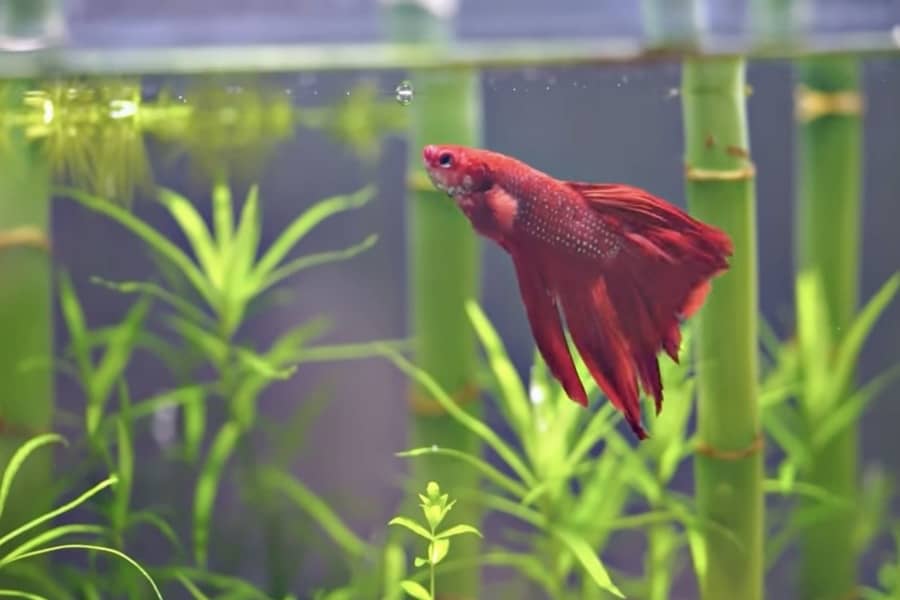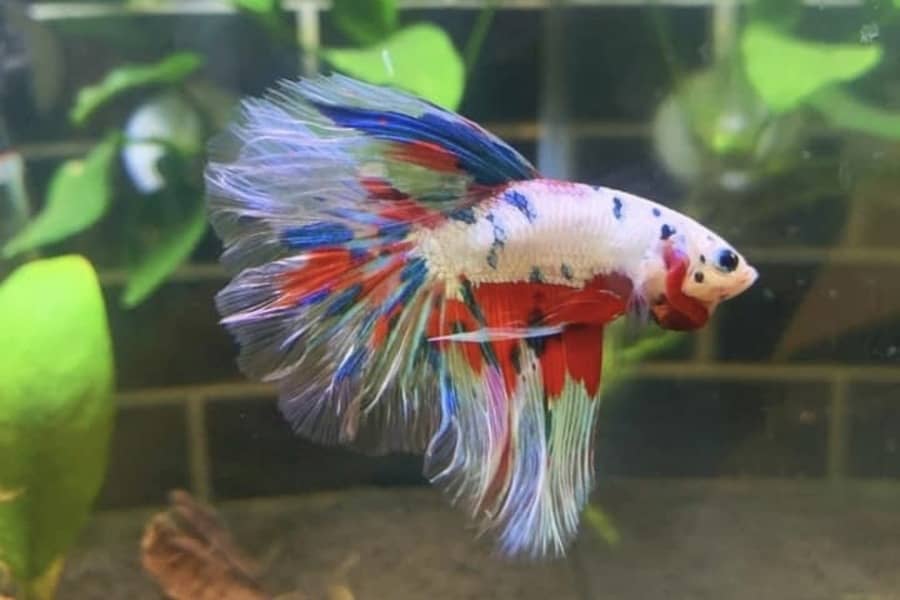How Long Can A Betta Fish Go Without Food?
This post may contain affiliate links.
 So you want to go on a vacation but are worried about leaving your betta fish unfed. The thought of your beloved bettas starving to death while you are away from home is making you anxious. For peace of mind, all you want is a reliable answer to how long betta fish can survive without eating.
So you want to go on a vacation but are worried about leaving your betta fish unfed. The thought of your beloved bettas starving to death while you are away from home is making you anxious. For peace of mind, all you want is a reliable answer to how long betta fish can survive without eating.
If that sounds like you, you have come to the right place.
How Long Can Betta Fish Live Without Food?
A healthy betta fish can survive without food for about 7 to 14 days. But ideally, keeping your fish unfed for more than a week is not a good idea. Prolonged periods without food can be detrimental to the fish’s health and well-being.
Can Betta Fish Really Survive Without Food?
The consensus is betta fish can go up to roughly 2 weeks without eating. But it doesn’t mean you should test the limits or tetter on the edge.
For a fish accustomed to being fed 2 meals a day, it’s not healthy to go that long without food. Your betta will likely survive, but it will be a stressful experience.
The 2-week period (suggested by most online blogs and fish forums) is a generalization. The truth is, there is no guaranteed ‘time frame’ a betta can go without food.
All bettas are different in age, health, metabolism, and environment. Affected by these conditions, one betta may survive for 20 days or longer, and another may die within 10 days of no food.
If you want to be almost certain that your betta remains alright and suffers less, don’t leave the fish without food for more than a week.
How Starvation Can Affect Your Betta’s Health?
After a week of no food, a betta starts to tap into its reserves, entering starvation mode. As an immediate effect, it causes stress levels to go high, resulting in discoloration and changes in body weight and chemical composition.
Several studies demonstrated that starvation has numerous effects on fish’s physiological and morphological properties.
Extended periods without food can weaken the fish’s immune system, make them susceptible to diseases, and lead to malnutrition.
Starvation is a common situation for fish to experience in the wild. But you shouldn’t be making it a regular thing for your bettas in captivity. Prolonged starvation practiced routinely can seriously damage the fish’s organs, stunt their growth, and reduce life expectancy.
Putting a small helpless animal through starvation is not only unethical, but it also takes a toll on your pet’s health and well-being.
If you need to stay away for more than a week, it’s recommended to make suitable arrangements to ensure your betta fish is adequately fed.
Best Ways To Keep Your Betta Fed While On Vacation

Having assured your pet is well fed and taken care of while you are away enjoying your days is essential for peace of mind.
While on vacation, common ways to feed your Betta include getting a fish sitter, an automatic fish feeder, and vacation food blocks. Each has its pros and cons. Use your discernment and choose what’s most optimal for you.
1. Get a Fish Sitter
You can ask your neighbor, a close friend, or a relative to feed your betta and watch over him while you are away. It would be best to have someone you trust. It’s important to show them how much to feed and warm them, not to overfeed the fish.
Bettas are more likely to die from being overfed than from skipping a few meals. Someone who doesn’t know about fish keeping can easily overestimate just how much food a fish needs to eat.
Do you know? The consensus is Betta’s stomach is equal to its eyeball.
If you want absolute peace of mind, pre-measure and portion out the meals so they can’t overfeed/underfeed your beloved aquatic pet. You can use those weekly pill trays or make little pockets out of paper to have the exact feeds for the days you are not around.
If you can’t get a fish sitter, another option is to get an auto-feeder.
2. Buy An Automatic Feeder
Automatic fish feeders are designed to dispense small amounts of food at regular intervals while you are away or at home. A timed feeder lets you decide how much and how often your betta should be fed.
When buying an automatic feeder, make sure it’s reliable and of high quality. Cheap ones are often inaccurate and easy to malfunction. Dumping extra food is often a possibility, which can lead to death from overeating or disrupted water parameters.
It’s crucial to test and calibrate any automatic feeder before leaving to ensure it functions correctly and doesn’t overfeed or underfeed your fish.
Auto feeders are ideal for larger community tanks as they drop more food than a betta should eat. You may also need a battery backup if power outages are an issue in your area.
Best Automatic Fish Feeders
#1 EHEIM Programmable Automatic Food Dispenser
#2 Petbank Rechargeable Fish Food Dispenser
3. Vacation Food Blocks
Vacation feeder blocks are made to slowly release the food into the water. However, they are less reliable. The timed food release mechanisms can get faulty and result in ammonia spikes.
While we were researching for these time-released fish food blocks, we came across many reviews suggesting: it’s more likely that feeding with one of these will kill your betta than dying of starvation.
How To Prepare Your Betta Tank Before Leaving on Vacation?

Your tank conditions significantly affect how long your betta can go without food.
Water Quality Instructions
Do you know poor water quality is more stressful to bettas than starvation from missing a few days of food?
- Perform a water change right before you leave and as soon as you return.
- As your tank will remain unattended for the days you aren’t around, to make up for that, do routine maintenance, clean the debris, and check all equipment to ensure they are functioning well.
- Test your aquarium water for pH, nitrate, nitrite, and ammonia.
The larger the tank, the more stable and safer it is for extended periods of no care. If you have an extremely small aquarium that requires frequent water changes to keep the toxins low, it’s best to find a bigger temporary home for your bettas.
You can also ask your fish sitter to do water changes, but only if required. Don’t forget to leave clear instructions for the caregiver so there is no chance of mishap.
Feeding Instructions
Feed your betta a regular meal before you leave. Don’t try to overcompensate for the days you’ll be away. If you put extra food into the tank, your betta will overeat and get bloated, and there will be no one to treat the poor fish.
The day you plan on leaving, feed your fish something protein-rich, such as thawed bloodworms.
Water Temperature
Bettas are cold-blooded, which means their metabolism speed is a direct result of the water temperature that surrounds them.
Lowering water temperatures slow down the betta’s metabolism rate, which can be helpful if you are vacationing. A slightly cooler temperature will make your betta less active, thus decreasing the number of calories needed to survive.
Bettas are tropical fish and thrive in temperatures of 78–80 degrees Fahrenheit. However, when you are away, for the time being, aim to keep the tank’s temperature between 70-74 degrees Fahrenheit.
Anything below than this can cause discomfort to the betta and may increase their chances of contracting diseases.
NOTE: If you have made any feeding arrangements for your pet, there’s no need to lower the temperature.
Timed Tank Lighting
Fish in captivity depend on the lighting they receive in the tank to distinguish between day and night. Like humans, bettas rest at night and are active during the day.
Understandably, you shouldn’t leave your light on or keep it off.
The best way is to set a timer on your aquarium light to ensure the day and night cycles aren’t disrupted while you are on holiday.
FAQs
Can you take your betta with you when going away for a few days?
It’s better to leave your fish at home than take it with you. Too many things can go wrong, and a trip can be more stressful for your betta than going without food for a few days.
Is fasting helpful for betta fish?
Many peoples prefer to fast their betta once a week. It’s particularly beneficial for fish prone to bloating or constipation.
Final Words
Under normal circumstances, a healthy betta fish can survive for about 7 to 14 days without eating. However, it’s best to keep the no-food period to less than a week.
Moreover, it’s crucial to prepare your tank before leaving. An optimal tank condition will mitigate any unnecessary stress your betta may experience while you are away.
